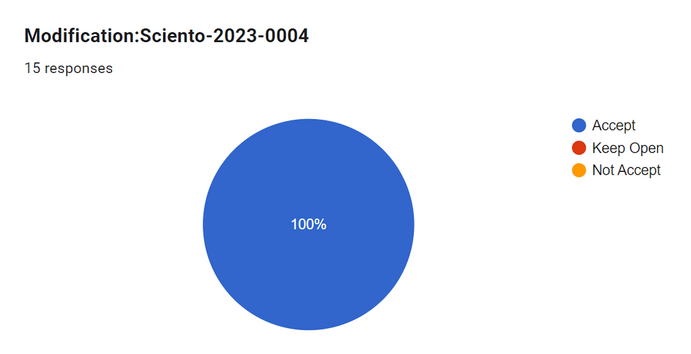Difference between revisions of "Modification:Sciento-2023-0004"
(Created page with "{{Modification |Community=Community:Scientonomy |Acronym=Sciento |Summary=Accept that noun-adjective pairs within the RSC can be indicative of communal theory acceptance. |Dat...") |
|||
| Line 12: | Line 12: | ||
|Modification=Accept that noun-adjective pairs within the RSC can be indicative of communal theory acceptance. | |Modification=Accept that noun-adjective pairs within the RSC can be indicative of communal theory acceptance. | ||
|Automatic=No | |Automatic=No | ||
| − | |Verdict= | + | |Verdict=Accepted |
| − | |Date Assessed Year= | + | |Date Assessed Year=2024 |
| − | |Date Assessed Month= | + | |Date Assessed Month=February |
| − | |Date Assessed Day= | + | |Date Assessed Day=22 |
|Date Assessed Approximate=No | |Date Assessed Approximate=No | ||
| − | |Verdict Rationale= | + | |Verdict Rationale=During [[Scientonomy Workshop 2024|2024 workshop]], Andrew Wong noted that he was already using the noun-adjective pairs that this modification concerns to train AI models for the future scientonomy database project. Although Stephanie Cui pointed out that these pairs were from the RSC and as such might not be as relevant for investigating scientific change in different cultures and time periods, she still agreed that this was an excellent starting point. Hakob Barseghyan also noted that there was not as much at stake in accepting the modification as there would be in rejecting it (and essentially stating that the RSC pairs cannot ever be indicative of communal theory acceptance). Andrew Chung suggested that involving other scholars in the digital humanities could help us further refine our use of corpus linguistics strategies in the future. Thus, the acceptance of this modification would bring interdisciplinary benefits for scientonomers too. The modification was accepted unanimously (15/15 votes to accept). |
| − | |Verdict Chart= | + | |Verdict Chart=Sciento-2023-0004 Voting Results.png |
|Superseded By= | |Superseded By= | ||
}} | }} | ||
Latest revision as of 14:01, 20 June 2024
Accept that noun-adjective pairs within the RSC can be indicative of communal theory acceptance.
The modification was suggested to Scientonomy community by G. G. Shan on 31 December 2023.1 The modification was accepted on 22 February 2024.
Preamble
Corpus linguistics can accelerate the work of observational scientonomy by computationally identifying potential cases of communal theory acceptance in early modern England. A set of noun-adjective pairs potentially synonymous with “accepted theory” was identified using corpus searches. Following this, around 1,400 excerpts potentially indicating instances of theory acceptance were retrieved using corpus queries containing the noun-adjective pairs. Following the presentation of corpus search results, possible strategies for identifying the epistemic agent, as well as the RSC’s place within the broader historical context were discussed. The prospect of implementing corpus linguistics in observational scientonomy arguably brings the Tree of Knowledge project closer to the actualization of a database; for this reason, while corpus linguistics is being explored, so should the methodologies for interpreting computationally retrieved data.
Modification
Accept that noun-adjective pairs within the RSC can be indicative of communal theory acceptance.
Verdict
The modification was accepted on 22 February 2024. During 2024 workshop, Andrew Wong noted that he was already using the noun-adjective pairs that this modification concerns to train AI models for the future scientonomy database project. Although Stephanie Cui pointed out that these pairs were from the RSC and as such might not be as relevant for investigating scientific change in different cultures and time periods, she still agreed that this was an excellent starting point. Hakob Barseghyan also noted that there was not as much at stake in accepting the modification as there would be in rejecting it (and essentially stating that the RSC pairs cannot ever be indicative of communal theory acceptance). Andrew Chung suggested that involving other scholars in the digital humanities could help us further refine our use of corpus linguistics strategies in the future. Thus, the acceptance of this modification would bring interdisciplinary benefits for scientonomers too. The modification was accepted unanimously (15/15 votes to accept).
Click on the Discussion tab for comments.
References
- ^ Shan, G. G. (2023) Corpus Linguistics Strategies for Identifying Accepted Theories in Early Modern England. Scientonomy 5, 47-71. Retrieved from https://scientojournal.com/index.php/scientonomy/article/view/42259.
